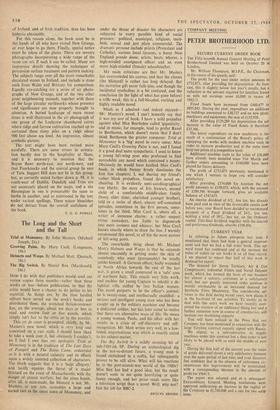The Long and the Short and the Tall
The Big Switch. By Muriel Box. (Macdonald, 16s.) How I do wish that publishers would send out review copies three months—rather than three weeks or less—before publication, so that the critic would have a chance to do justice to his material. As things are, by the time hustled editors have sorted out the week's books and distributed them, the wretched fiction-reviewer has, on the average, about ten days or less to read and review four or five novels, which simply isn't fair to the critic or to the novelist.
This cri de cteur is prompted, chiefly, by Mr. Masters's new novel, which is very long and conceived on a vast scale. I should have liked to take a week over it, but obviously I couldn't, so I feel I owe him my apologies. Trial at Monomoy is in the tradition of The Last Days of Pompeii and The Rains Came, concerned as it is with a natural calamity and its effects upon a widely assorted collection of characters. The blurb suggests that it is a 'huge allegory,' and tacitly equates the threat of a major blizzard on the coast of Massachusetts with the danger of atomic warfare; but the atom bomb, after all, is man-made, the blizzard is not. Mr. Masters, at any rate, assembles a large and varied cast in the coast town of Monomoy, and
under the threat of disaster his characters are subjected to every possible kind of social pressure: political, municipal, religious, snob- bish, sexual and just plain commercial. The dramatis personae include priests (Protestant and Catholic), various local tycoons, a bossy New England grande dame, artists, beats, whores, a high-minded coastguard officer and an even more high-minded (female) schoolteacher.
My main criticisms are that Mr. Masters has overcrowded his canvas, and that the climax (the blizzard) is rather too long delayed. But his narrative gift never fails him, and though the incidental symbolism is a bit confused, and the conclusion (in the light of what has gone before) a trifle weak, this is a, full-blooded, exciting and highly readable novel.
Much as I admired—and indeed enjoyed— Mr. Masters's novel, I can't honestly say that it was my sort of book. I have a mild prejudice against what Max Beerbohm called `giganticity,' and in music, for example, tend to prefer Ravel to Beethoven, which doesn't mean that I don't think Beethoven the greater composer. Trial at Monomoy is a 'big' novel in every sense; Miss Mary Cecil's Growing Pains is not, and I found it a good deal more sympathetic. I used to know a young left-wing poet who professed to find unreadable any novel which contained a nanny. Obviously he would have loathed Miss Cecil's book, in which Nanny firmly dominates the first few chapters; I, not sharing my friend's rather bleak prejudices, found this novel en- chanting. It is evidently semi-autobiographical (see blurb): the story of Iris Stewart, second child of a comfortable middle-class family (bossy elder sister, cherished younger brother), told in a series of short, almost self-contained episodes, sometimes in the first person, some- times in the third. Miss Cecil is, above all, a writer of immense charm: a rather suspect virtue nowadays, too liable to degenerate into mere cosiness and whimsy; but Miss Cecil knows exactly where to draw the line. I warmly recommend this novel, to all but the most austere of left-wing poets.
The remarkable thing about Mr. Michael Mott's Helmets and Wasps is that he succeeds almost uncannily in getting under the skin of somebody who must (presumably) be totally unlike himself. A German officer, badly wounded in North Africa towards the end of the last war, is given a small command in a 'safe' area of northern Italy. This entails very little work, and enables the young Captain to inhabit a de- lightful villa staffed by two Italian women. The novel purports to be the officer's journal; he is twenty-nine, and intellectually muddled: a serious and intelligent young man who has been caught up in the military machine and become a dedicated soldier, but has later come to realise that there are alternative ways of life. He meets a young woman, Paola, and his affair with her results in a crisis of self-discovery and self- recognition. Mr. Mott writes very well, in'a low- toned, unpretentious way which is exactly suited to his subject-matter.
The Big Switch is a mildly amusing bit of sub-/984-ish SF. During an archeological dig in the not-so-distant future, a young man is found embalmed in a coffin, but subsequently proves to be still alive. What will his reactions be to the post-atomic-war world of the 1980s? Miss Box has had a good idea, but the result doesn't seern to me quite horrifying or quite funny enough, and her prose reads more like a television script than a novel. Well, why not? Just the job for BBC-2.
JOCELYN BROOKE


































 Previous page
Previous page